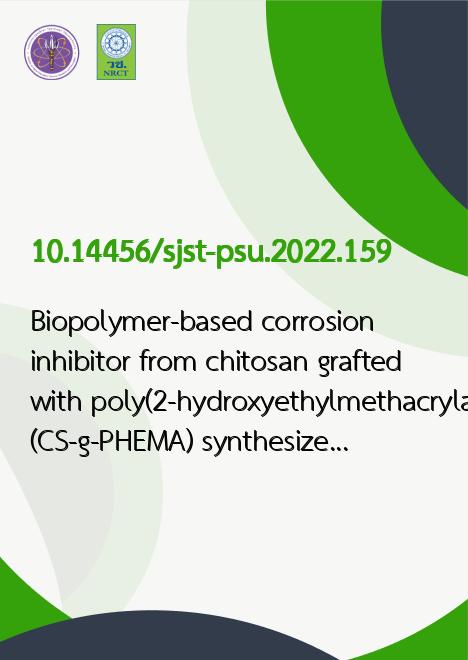
|
Biopolymer-based corrosion inhibitor from chitosan grafted with poly(2-hydroxyethylmethacrylate) (CS-g-PHEMA) synthesized by ultrasound-assisted method |
|---|---|
| รหัสดีโอไอ | |
| Creator | 1. Sani Nazifi Dalhatu 2. Santi Khoonsap 3. Siriwimol Suwannarat 4. Sujitra Amnuaypanich 5. Sittipong Amnuaypanich |
| Title | Biopolymer-based corrosion inhibitor from chitosan grafted with poly(2-hydroxyethylmethacrylate) (CS-g-PHEMA) synthesized by ultrasound-assisted method |
| Publisher | Research and Development Office, Prince of Songkla University |
| Publication Year | 2565 |
| Journal Title | Songklanakarin Journal of Science an Technology (SJST) |
| Journal Vol. | 44 |
| Journal No. | 5 |
| Page no. | 1225-1231 |
| Keyword | ultrasound, chitosan, poly(2-hydroxyethylmethacrylate), corrosion inhibitors, biopolymers |
| URL Website | https://sjst.psu.ac.th/ |
| ISSN | 0125-3395 |
| Abstract | A biopolymer-based corrosion inhibitor was developed from CS grafted with PHEMA. The CS-g-PHEMA wassuccessfully synthesized by using an ultrasound-assisted method. The synthesized CS-g-PHEMA was employed as corrosioninhibitor for mild steel. The corrosion test by gravimetry under 0.2 M H2SO4 revealed that, in comparison with CS, the inhibitionefficiency of CS-g-PHEMA was higher reaching 90% at 500 ppm, while the corrosion rate with CS-g-PHEMA was reduced to ahalf. Furthermore, Ea of the corrosion was higher with CS-g-PHEMA compared to that with CS, indicating a higher energybarrier for the corrosion reactions. The potentiodynamic polarization measurement clearly showed a superior effect of CS-gPHEMA on retarding anodic oxidation and cathodic reduction on the mild steel surface. This is because adsorbed CS-g-PHEMAlimits the diffusion of H3O+to participate in anodic metal dissolution or cathodic hydrogen evolution on the mild steel surface. |
